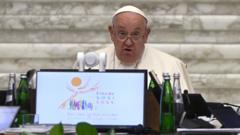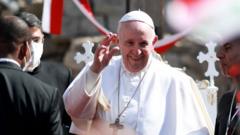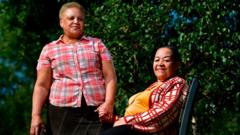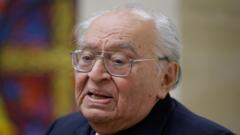The recent Vatican summit has drawn to a close, emphasizing the necessity of amplifying women's leadership within the Catholic Church. However, it notably did not endorse proposals for the ordination of women as priests, despite aspirations from progressive factions. Pope Francis had opened the summit to lay participation, allowing almost 60 women among the 368 voting delegates, marking a historic inclusion in a traditionally male-domained assembly.
Papal Summit Concludes with Emphasis on Women's Leadership in the Catholic Church

Papal Summit Concludes with Emphasis on Women's Leadership in the Catholic Church
A significant Vatican summit wraps up with a push for expanded leadership roles for women, while avoiding calls for their ordination.
All 151 proposals garnered approval, yet the suggestion to elevate women's leadership roles faced the highest dissent, highlighting ongoing tensions within the Church. While advocates sought the recognition of women as deacons—who have certain liturgical functions—the final document stated that women should be empowered in leadership roles, albeit without concrete steps toward ordination. Notably absent from the final document were explicit measures for the inclusion of the LGBT+ community, save for a vague reference regarding acceptance and inclusivity for individuals facing judgment based on their identity or relationships.
Reverend James Martin, a progressive priest, expressed no shock at this omission, indicating a broader trend in traditional opposition to such reforms. The summit, aimed at gauging the worldwide Catholic perspective, faced criticism from conservatives who resisted opening the dialogue to non-clerical voices. Despite these divergences, champions of the summit, including Pope Francis, termed it a "gift" to the global Catholic community, promoting grassroots involvement as pivotal to future Church initiatives.
Fr. Timothy Radcliffe, the summit's spiritual advisor, emphasized the importance of engaging in meaningful relationships across differing viewpoints globally, proposing that even in disagreement, deeper faith connections could emerge. However, the true impact of these discussions on Church policy remains to be seen, with observers noting a potential lack of boldness in final proposals, leaving some feeling as marginalized as ever.
As the Church navigates these complex discussions around inclusivity and leadership, it appears the conversation is only just beginning.
More on this story
- Pope gives women historic right to vote at meeting
- Pope appoints first woman to senior Synod position
- Pope launches consultation on Church reform
Catholicism, Pope Francis, Roman Catholic Church, Women, LGBT
Reverend James Martin, a progressive priest, expressed no shock at this omission, indicating a broader trend in traditional opposition to such reforms. The summit, aimed at gauging the worldwide Catholic perspective, faced criticism from conservatives who resisted opening the dialogue to non-clerical voices. Despite these divergences, champions of the summit, including Pope Francis, termed it a "gift" to the global Catholic community, promoting grassroots involvement as pivotal to future Church initiatives.
Fr. Timothy Radcliffe, the summit's spiritual advisor, emphasized the importance of engaging in meaningful relationships across differing viewpoints globally, proposing that even in disagreement, deeper faith connections could emerge. However, the true impact of these discussions on Church policy remains to be seen, with observers noting a potential lack of boldness in final proposals, leaving some feeling as marginalized as ever.
As the Church navigates these complex discussions around inclusivity and leadership, it appears the conversation is only just beginning.
- Pope gives women historic right to vote at meeting
- Pope appoints first woman to senior Synod position
- Pope launches consultation on Church reform
Catholicism, Pope Francis, Roman Catholic Church, Women, LGBT














